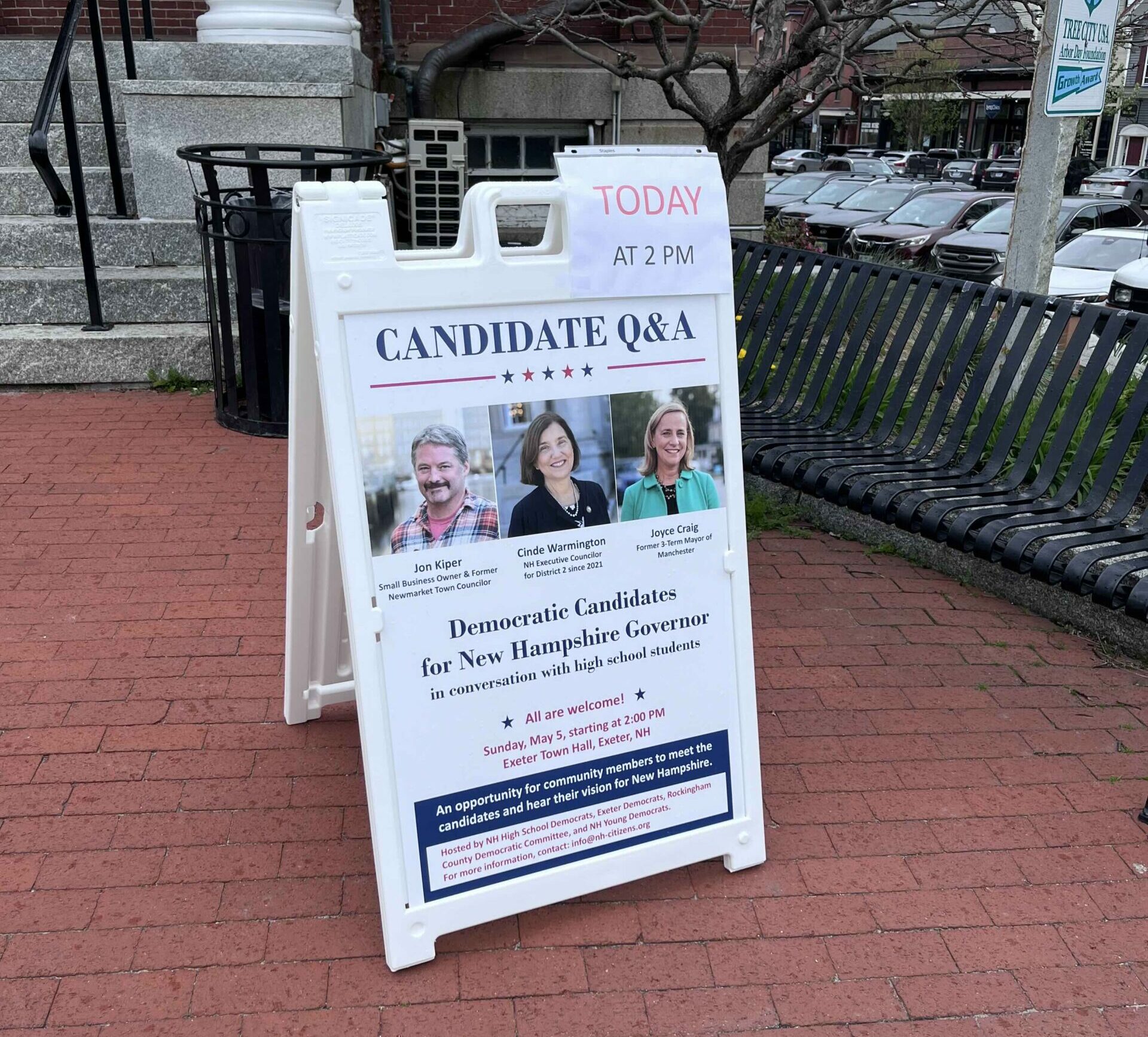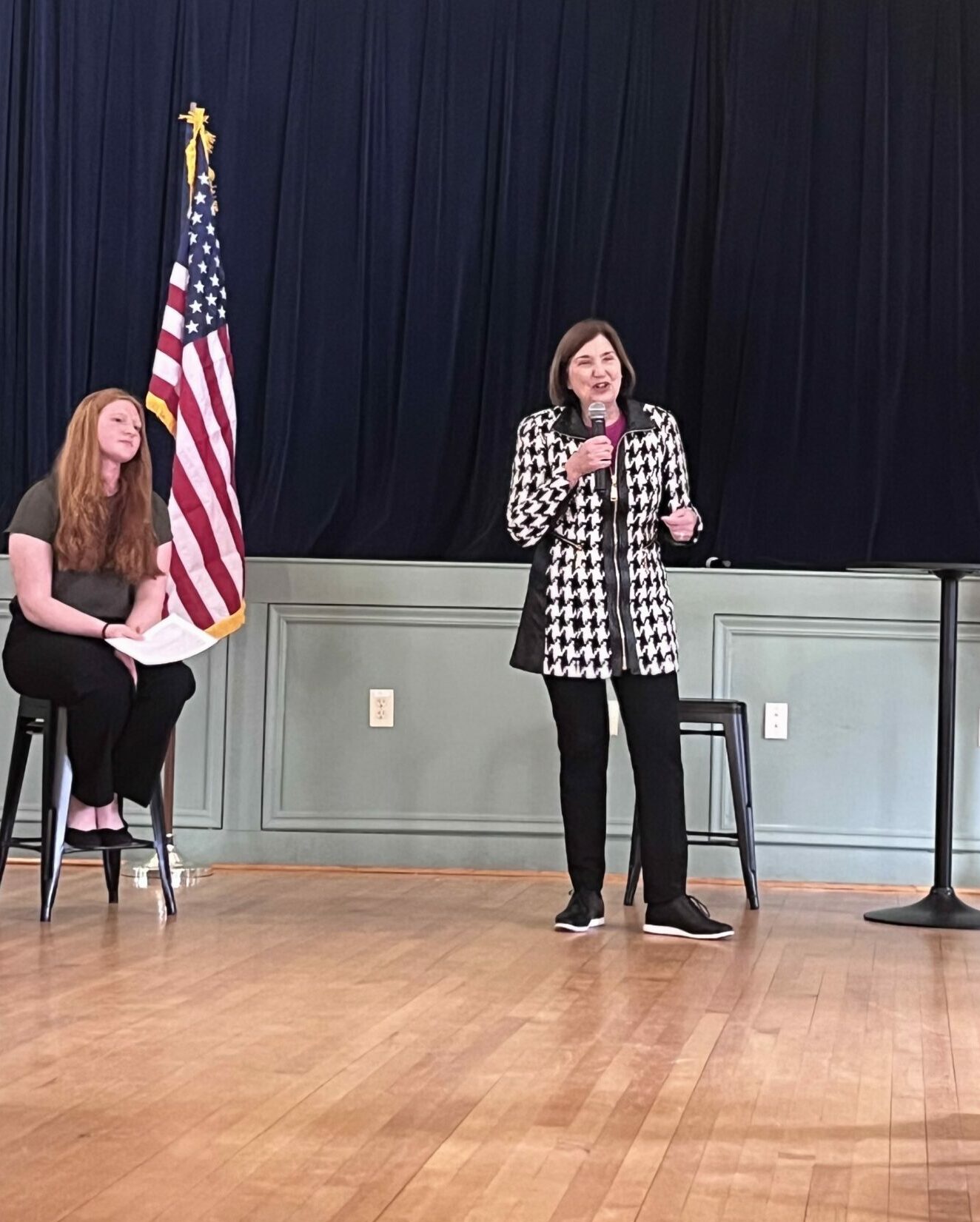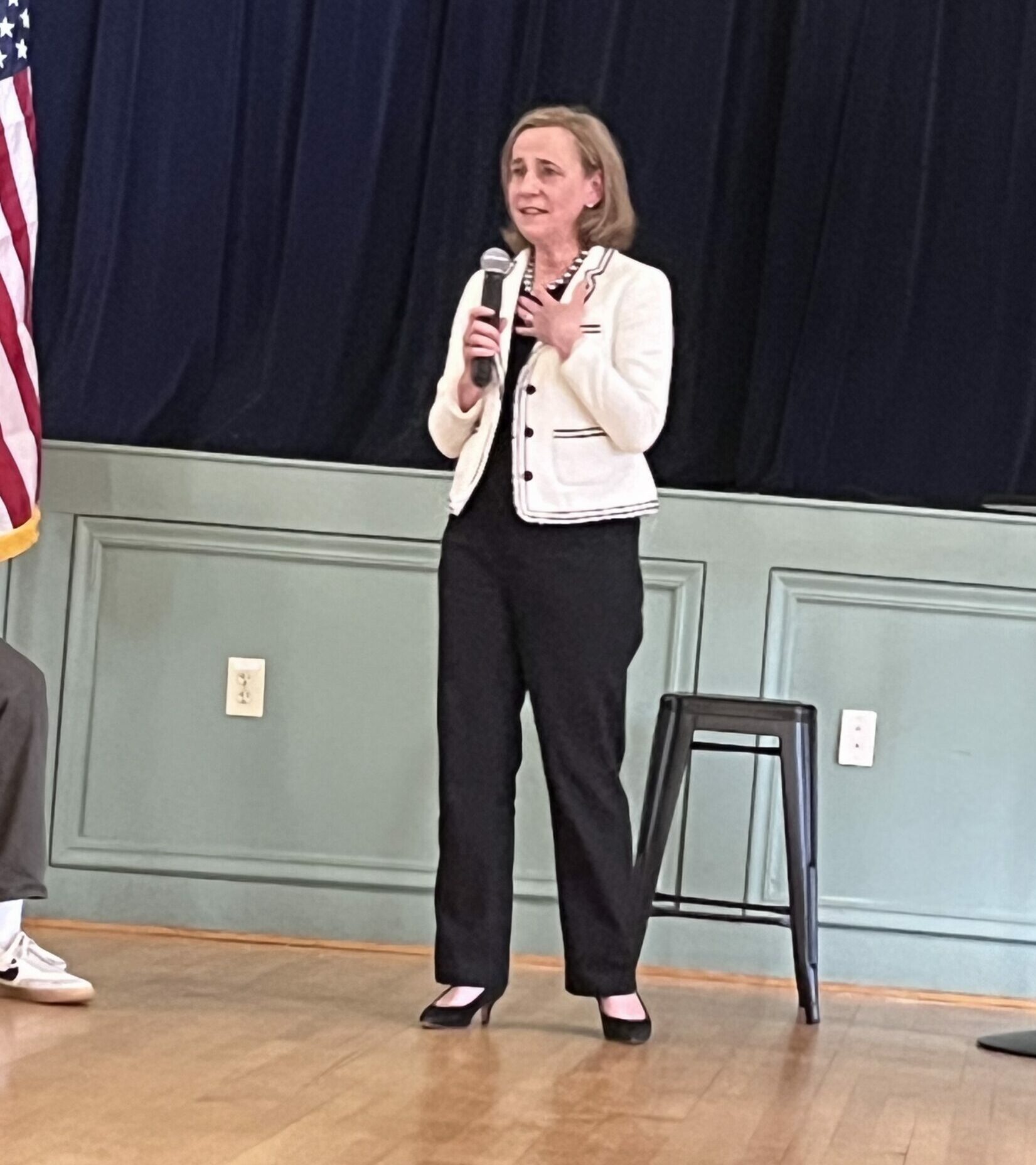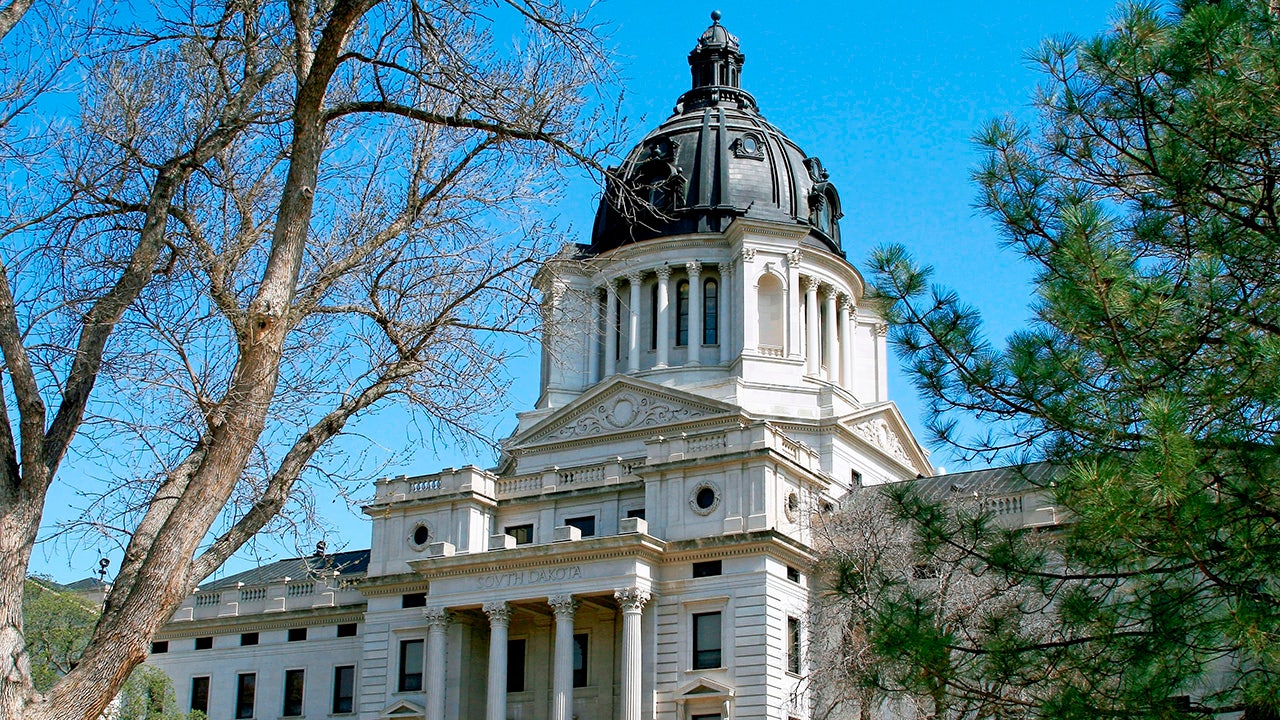New Hampshire
As UNH hosts rally against Gaza war, lawmakers weigh campus free speech protections • New Hampshire Bulletin

As campus demonstrations protesting Israeli actions in Gaza continue across the country, New Hampshire lawmakers are seeking to regulate how public colleges and universities respond to questions of free speech.
House Bill 1305 would insert freedom of speech rights on college campuses into state statute. The bill would establish that outdoor areas of campuses “shall be deemed public forums for members of the campus community” and would limit how much colleges and universities could bar demonstrations there.
The bill would also prevent public colleges and universities from discriminating against any religious, political, or ideological student organizations, even if the organization requires members to adhere to its beliefs, standards of conduct, or mission.
Proposed by Rep. Daniel Popovici-Muller, a Windham Republican, the bill follows similar campus speech legislation passed in other states. It was introduced partly in response to instances where conservative or Christian organizations in New Hampshire say they have been held back from participation on campus.
But it also comes against a backdrop of student demonstrations over the Israel-Hamas war that have divided campuses outside of New Hampshire, and that have prompted police crackdowns and fierce debate over the last week.
On Thursday evening, the student organization Palestine Solidarity Coalition UNH held a rally at Thompson Hall Lawn at the University of New Hampshire in New Hampshire.
HB 1305 is not in effect; the bill passed the House in March and has yet to receive a vote in the Senate. Representatives of the University System of New Hampshire have argued that they already have free speech policies that adhere to much of what is in the bill.
Others have taken issue with the provisions of the bill that apply to student organizations, arguing that the bill would prevent universities from banning groups that are discriminatory or exclusionary of certain groups.
But supporters say if signed by Gov. Chris Sununu, the bill would provide clearer guidelines for how administrators could act during difficult campus speech situations.
“What we’re doing is putting this into state law, so that universities are fully on notice – they know exactly what’s expected of them,” said Tyler Coward, lead counsel for the Foundation for Individual Rights and Expression, which advocates for free speech on campus.
The current rules
To some free speech advocates, HB 1305 is merely putting into law practices that colleges and universities should already be following. The 1989 U.S. Supreme Court case Ward v Rock Against Racism set a standard that a government or public authority can impose restrictions on the time, place, and manner of an event as long as they are content-neutral and narrowly tailored.
HB 1305 would codify that doctrine, allowing a public higher education institution to “maintain and enforce reasonable time, place, and manner restrictions” on events, so long as they were both content and viewpoint neutral, meaning that they apply to all groups. That means that a college could set a time limit for a demonstration, or set limits on how close to other buildings protestors could stand.
By some metrics, UNH already has strong freedom of speech protections in its policies. The university received third place in the Foundation for Individual Rights and Expression’s national rankings for free speech in 2024, the second time in three years. Those rankings rely on surveys to determine whether students on campus feel free to voice their opinions as well as the university policies themselves.
One of those, UNH’s Outdoor Events and Assemblies policy, states that organizers of any demonstration expected to draw more than 25 people must apply for a permit to do so. To get a permit they must obtain permission from the Durham Fire Department, the chief of UNH police, the relevant manager of grounds and roads, and other campus officials depending on location.
Demonstrations are not allowed everywhere; UNH’s policy states that they include areas open to the public “that do not serve a specific educational, administrative, research, health, residential, dining, athletic, or recreational purpose.”
A divide over student clubs
Despite UNH’s high rankings for free speech, supporters of HB 1305 argue the state should include protections in statute – and should add new protections for student groups. That argument was driven by incidents involving conservative students.
In 2022, a group of students at the University of New Hampshire Franklin Pierce School of Law attempted to create the “Free Exercise Coalition.
The campus club would bring together students who subscribe to a belief “that it is OK for law students to have traditional Christian values” and to share those values, Jeff Ozanne, a UNH law student and current president of the club, told lawmakers in testimony this year. But the students received tough scrutiny from the Student Board Association, whose members raised concerns that those beliefs could be discriminatory, Ozanne said.
That same year, a different organization, the Christian Legal Society, also struggled to obtain recognition from the SBA and faced similar concerns that their mission and required beliefs would discriminate against others, including LGBTQ+ students.
Facing resistance, the groups sought help from a national organization standing for freedom of religion, the First Liberty Institute, which lobbied for UNH administrators to override the Student Board Association and approve the groups anyway, Ozanne said.
HB 1305 is in part designed to prevent that resistance, supporters say.
But critics of the bill have pointed to the UNH law school disputes as examples of the potential for universities and colleges to be required to approve groups that could discriminate against other viewpoints.
“It would allow student organizations to exclude others from membership based on race, gender identity, sexual orientation, or any other discriminatory beliefs and receive the same benefits as other student organizations, including financial support paid for through tuition, fees, and state taxes,” argued Rep. David Luneau, a Hopkinton Democrat.
Unclear applications to pro-Palestinian protests
HB 1305 is designed to require free speech protections on New Hampshire campuses. But amid arrests this week at campus protests at Columbia University in New York, Harvard University, University of Texas at Austin, and others, supporters of the bill say it wouldn’t necessarily prevent those same outcomes in New Hampshire.
While the bill would prohibit New Hampshire public colleges from creating “free speech zones” that would limit protest activity to certain areas, it would still allow for colleges to disband demonstrations if they “materially or substantially disrupt the functioning” of the institution.
That includes instances where one person or group “significantly hinders” another’s ability to express themselves in the same space, including through violent or unlawful behavior, or the use of threats. The bill also would prevent harassment, defined as “expression that is unwelcome, so severe, pervasive and subjectively and objectively offensive, that a student is effectively denied equal access to educational opportunities or benefits” on campus.
Sen. Tim Lang, a Sanbornton Republican, said that provision is designed in part to prevent activist groups from shutting down speaking events on campus by shouting down speakers or otherwise creating an unsafe environment. “The idea behind what’s called a heckler’s veto,” he said in an interview.
But the provisions could also be used to justify crackdowns on other forms of protest, too.
After pro-Palestinian student demonstrators set up encampments at Columbia University, President Minouche Shafik authorized the New York Police Department to enter campus last Thursday and make arrests, arguing that some demonstrators had used antisemitic language and threats against Jewish students, creating a threatening atmosphere.
In Texas, Gov. Greg Abbott directed State Police to make arrests at the University of Texas at Austin Wednesday. Both Shafik and Abbott have been criticized by free speech advocates for the enforcement actions.
Coward said that theoretically, New Hampshire’s proposed law could allow for similar action, depending on the type of speech and action taken by demonstrators. Addressing the protests outside New Hampshire, FIRE has called on universities to respect peaceful student protests but it has also advised students not to engage in violent behavior.
But Coward also noted that the New Hampshire bill includes a recourse for students to sue a public college or university if they feel that the statute was violated, and to receive up to $20,000 in damages plus attorney’s fees if successful.
“This bill just makes it easier (for students ) to get into state court and to vindicate their rights in state court,” he said. “I think that’s important.”
Lang argued that the bill was designed to protect most speech, but not all speech.
“That protest can’t be calling for the end of the Jewish state,” he said. “Because now you’re stepping into hate speech or discriminatory speech. But they can call for a ceasefire. Pro-Palestinian people can call for Israel to stop. And the same with … the Jewish League could get up and say we want them to stop.”
In a statement Thursday, UNH said it was “deeply committed to the safety of our campus community” and “similarly committed to its role as a public university in protecting free speech on campus.”
“We are responsible, however, for ensuring an individual’s speech is allowed to occur safely,” the statement read. “The bar for any public institution to restrict, or allow others to interrupt, an individual’s speech is, and should be, very high.”

New Hampshire
'No Safe Experience': New Hampshire Officials Stress Fentanyl Awareness Tuesday

CONCORD, NH — Fentanyl continues to be mixed into many illicit drugs with devastating results.
Last year, three individuals were found dead in a Littleton home after reportedly ingesting cocaine laced with fentanyl. Cases like this, where individuals experiment with drugs and result in catastrophic consequences, are why there is “No Safe Experience” when it comes to taking illicit drugs because they could contain fentanyl.
With National and New Hampshire Fentanyl Awareness Day on May 7, officials in New Hampshire are calling on all individuals to be aware of the life-threatening dangers associated with fentanyl, a substance that is 50 to 100 times stronger than heroin and morphine. The statewide public awareness campaign “No Safe Experience” focuses on educating youth, young adults and families of the prevalence of fentanyl in illicit drugs and counterfeit pills and a very small dose can lead to death due to its high potency.
According to the New Hampshire Department of Safety, there were 430 overdose deaths in the Granite State in 2023. Of these, nearly 85 percent were from substances where fentanyl was present. In the same year, there were 4,080 suspected overdose incidents reported, many of which required Narcan use by first responders. Death tolls may have been significantly higher if these measures were not taken.
“Fentanyl is an unforgiving, deadly, invisible killer that can take the life of anyone who decides to use an illicit substance,” Colonel Mark Hall, the director of the New Hampshire State Police, said. “It is important to create a high level of awareness that there is No Safe Experience when it comes to illicit drugs and fake pills, as our forensic lab commonly finds fentanyl in these types of substances.”
Gov. Chris Sununu issued a proclamation declaring May 7, 2024, Fentanyl Awareness Day in New Hampshire. The proclamation stated that “illicit fentanyl use is widespread and deadly and poses a significant public health risk. The State of New Hampshire joins all those who have been affected by fentanyl misuse in spreading awareness of the harm that fentanyl can cause; resources are available for loved ones dealing with substance misuse; and reminds all Granite Slaters there is No Safe Experience when consuming any drugs that have not been prescribed by a medical provider and taken by the person they were prescribed to as directed by a healthcare professional.”
Fentanyl is a powerful synthetic opioid typically used to treat patients with chronic severe pain or severe pain following surgery. A dose the size of a few grains of salt can be lethal, and it is often found to be mixed with other illicit substances, including cocaine, methamphetamines, and heroin. It is now regularly seen in fake pills branded as Oxycodone and Percocet, among others, and is undetectable without testing.
According to an April 2024 report by Statista, there has been a dramatic surge in drug overdose deaths in the U.S. over the past 10 years, which is primarily driven by the rise of synthetic opioids such as fentanyl. According to preliminary data published by the Centers for Disease Control and Prevention, drug overdose deaths exceeded 110,000 in 2022, with synthetic opioids involved in 76,000 of those deaths.
The No Safe Experience campaign will run through the fall and is focused on individuals who may be inclined to try substances without fully understanding what they are, where they came from and what might actually be in them. The campaign includes videos, public service announcements, social media resources, billboards, and an informational website. Posters, racks cards and decals were distributed to 217 public middle and high schools and educational toolkits and resources are available to schools across the state.
For more information, facts, and resources, visit NoSafeExperience.org.
Submitted by the New Hampshire Department of Public Safety.
New Hampshire
New England woman was driving 112 mph with children unbuckled in backseat, police say

A New Hampshire woman was driving 112 mph, weaving in and out of traffic and had two children unbuckled in the backseat on Friday, according to New Hampshire State Police.
Shirley Stanley, 23, of Manchester, faces multiple charges, including two counts of endangering the welfare of a child.
The mother of the two children was driving a Chevrolet Tahoe SUV on Route 101 when police saw her driving at a “high rate of speed” around 9:17 p.m. on Friday. Police said at one point she was driving 112 mph.
The two children, ages 1 and 4, were not buckled or in any type of child restraint system, police stated.
Stanley was arrested and charged with reckless operation, two counts of endangering the welfare of a child, two counts of violating required child passenger restraints, failure to yield to an emergency vehicle, unsafe lane change, following too closely and speeding. She was processed and released on personal recognizance bail.
New Hampshire State Police are asking others who saw Stanley’s driving before she was pulled over to contact Trooper Jacob Benjamin at Jacob.A.Benjamin@dos.nh.gov or #NHSP dispatch at (603) 223-4381.
Stanley is scheduled to appear in Candia District Court at 8 a.m. on June 10.
New Hampshire
Housing, Abortion, and Ayotte Are Top Topics at NH Dem Candidates' Forum in Exeter – NH Journal

When New Hampshire’s Democratic candidates for governor gathered for a forum at Exeter Town Hall Sunday afternoon, the top topics were affordable housing, abortion rights, climate change, Education Freedom Accounts, and Republican gubernatorial candidate Kelly Ayotte.
Left unmentioned?
Inflation, illegal immigration, anti-Israel protests roiling Granite State college campuses, and the other GOP candidate for governor, former state Senate President Chuck Morse.
The topics were selected in part by the organizers, students from New Hampshire high schools like Oyster River High, Raymond High, and Phillips Exeter Academy. But the three candidates were able to add their own topics, and it was clear they wanted to talk about Ayotte.
“We have to call Kelly Ayotte out for what she stands for,” former Manchester Mayor Joyce Craig said. “She is the most dangerous threat to New Hampshire that we have ever seen.”
And, Craig added, “We need to make sure we put forward a candidate who can beat her, and I’m telling you, I can.”
Craig, the current primary frontrunner according to the most recent polling, fielded students’ questions in front of a crowd of around 100 people, along with Executive Councilor Cinde Warmington and former New Market town councilor Jon Kiper.
Kiper, the least well-known of the three candidates, was the first to speak. He said his campaign is “all about housing.”
“Every year that we don’t focus on housing as Democrats, we are losing young people and that’s our base,” Kiper said.
Asked by student about laws affecting the transgender community, Kiper said he opposed any restrictions on sex-change medical procedures and called the issue a GOP “smoke screen so we don’t talk about the real issues of property taxes and housing and homelessness and opioid addiction.”

NH Democratic candidate for governor Cinde Warmington speaks at a candidate’s forum in Exeter, N.H. on May 5, 2024
Warmington was the second to speak. She took the opportunity to promote her political bona fides as the lone Democrat serving on the state’s Executive Council. Asked about updates to New Hampshire abortion laws under GOP Gov. Chris Sununu, Warmington said she has gone “toe-to-toe” with him “on the danger of his abortion ban.”
(Sununu signed a law in 2022 allowing abortion for any reason during the first six months of pregnancy, and bans them — with exceptions — after that.)
Warmington also claimed “Republicans have made it perfectly clear that they do not want to run against me.”
“In fact, when the governor was asked about this race on the radio, and asked about the Democratic primary, his answer to the question was ‘Warmington will be formidable,’” she said. “He knows that because I am the only person in New Hampshire who ever goes toe-to-toe with Gov. Sununu.
“He doesn’t go down and talk to the legislature. He only talks to the press when he wants to. But every two weeks, at that council table, there I am asking the tough questions.”
Warmington also said public education “is under assault” by Education Freedom Accounts, a New Hampshire program offering families state funding should they choose to enroll their children in a non-public school.
Warmington was later quizzed about her time in 2002 working as a lobbyist representing Purdue Pharma, producers of the opioid painkiller Oxycontin. She defended her work and said she “argued that doctors should be the ones to make the decision about what patients receive.”
Craig focused much of her remarks on her time serving as the city’s mayor and said her chief concern as

NH Democratic candidate for governor Joyce Craig speaks at a candidate’s forum in Exeter, N.H. on May 5, 2024
governor, like Warmington and Kiper, would focus on affordable housing.
She told the roughly 100 attendees at Sunday’s town hall that Manchester “today has one of the hottest job markets in the entire country.”
She also expressed her opposition to the state’s EFA program.
“As governor, I will ensure that our public tax dollars go to our public schools and on day one,” Craig said. “I’m not opposed to parents having a choice of where they send their kids to school.
“What I don’t agree with is providing public dollars to go to private or religious schools.”
Craig later pivoted back to her experience as Manchester mayor, and her 2017 win over former Mayor Ted Gatsas.
“I also took on a very popular four-term incumbent Republican when I became mayor of Manchester, so I know what it takes to get through the tough elections,” she said. “I’ve done it, I have a roadmap, and I plan on doing it again.”
While it didn’t appear to make much impact on the audience, Kiper had a proposal that’s likely to get some attention in Concord. He wants to pay the legislature.
“What I propose is 500 bucks a week for just the six months that the legislature is in session,” Kiper said. “This will enable working class folks to run and serve as state representatives if they want to.
“It is really less than $5 million a year.”
-

 News1 week ago
News1 week agoBoth sides prepare as Florida's six-week abortion ban is set to take effect Wednesday
-

 Politics1 week ago
Politics1 week agoColumbia University’s policy-making senate votes for resolution calling to investigate school’s leadership
-

 Politics1 week ago
Politics1 week agoGOP Rep. Bill Posey won't seek re-election, endorses former Florida Senate President as replacement
-

 World1 week ago
World1 week agoBrussels, my love? MEPs check out of Strasbourg after 5 eventful years
-

 World1 week ago
World1 week agoRussian forces gained partial control of Donetsk's Ocheretyne town
-

 Politics1 week ago
Politics1 week agoHouse Republicans brace for spring legislative sprint with one less GOP vote
-

 World1 week ago
World1 week agoAt least four dead in US after dozens of tornadoes rip through Oklahoma
-

 Politics1 week ago
Politics1 week agoAnti-Trump DA's no-show at debate leaves challenger facing off against empty podium



















